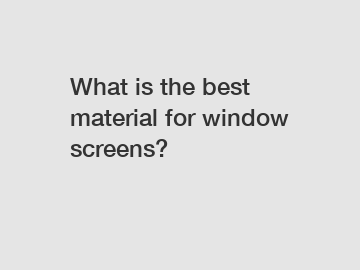When it comes to choosing the best material for window screens, there are several options to consider. Each material has its own set of pros and cons, so it's important to weigh your needs and preferences before making a decision. In this blog post, we'll explore the different types of materials available for window screens and help you make the right choice for your home.
One of the most popular materials for window screens is aluminum. Aluminum screens are lightweight, durable, and easy to install. They are also resistant to rust and corrosion, making them a great choice for windows that are exposed to the elements. However, aluminum screens can be prone to denting and bending, so they may not be the best option for high-traffic areas or homes with pets or children.
Another common material for window screens is fiberglass. Fiberglass screens are lightweight, flexible, and easy to clean. They are also resistant to UV rays and won't crease or dent like aluminum screens. Fiberglass screens are a good choice for windows that need to be opened and closed frequently, as they are less likely to tear or become damaged from regular use. However, fiberglass screens can be more expensive than aluminum screens, so they may not be the best option for homeowners on a tight budget.

For homeowners looking for a more eco-friendly option, there are also screens made from recycled materials. These screens are typically made from plastic bottles or other recycled plastics, making them a sustainable choice for environmentally-conscious homeowners. Recycled screens are just as durable and long-lasting as traditional screens, making them a great choice for those who want to reduce their carbon footprint without sacrificing quality.
One of the newest materials on the market for window screens is stainless steel. Stainless steel screens are incredibly durable and strong, making them an excellent choice for homes in areas prone to severe weather or high winds. Stainless steel screens are also resistant to rust and corrosion, making them a low-maintenance option for homeowners who want a screen that will last for years to come. However, stainless steel screens can be more expensive than other materials, so they may not be the best option for those on a tight budget.
Ultimately, the best material for window screens will depend on your unique needs and preferences. Consider factors such as durability, cost, and environmental impact when choosing a material for your window screens. Whether you opt for aluminum, fiberglass, recycled materials, or stainless steel, investing in high-quality window screens will help protect your home from pests, debris, and harmful UV rays while enhancing its aesthetic appeal.
In conclusion, there are several options to consider when choosing the best material for window screens. Each material has its own set of advantages and disadvantages, so it's important to carefully weigh your needs and preferences before making a decision. Whether you opt for aluminum, fiberglass, recycled materials, or stainless steel, investing in high-quality window screens will help protect your home and keep it looking great for years to come.
The company is the world’s best plain weave wire mesh, Spraying & Coating for Wire Mesh Products, metal insect screen supplier. We are your one-stop shop for all needs. Our staff are highly-specialized and will help you find the product you need.




Comments
Please Join Us to post.
0